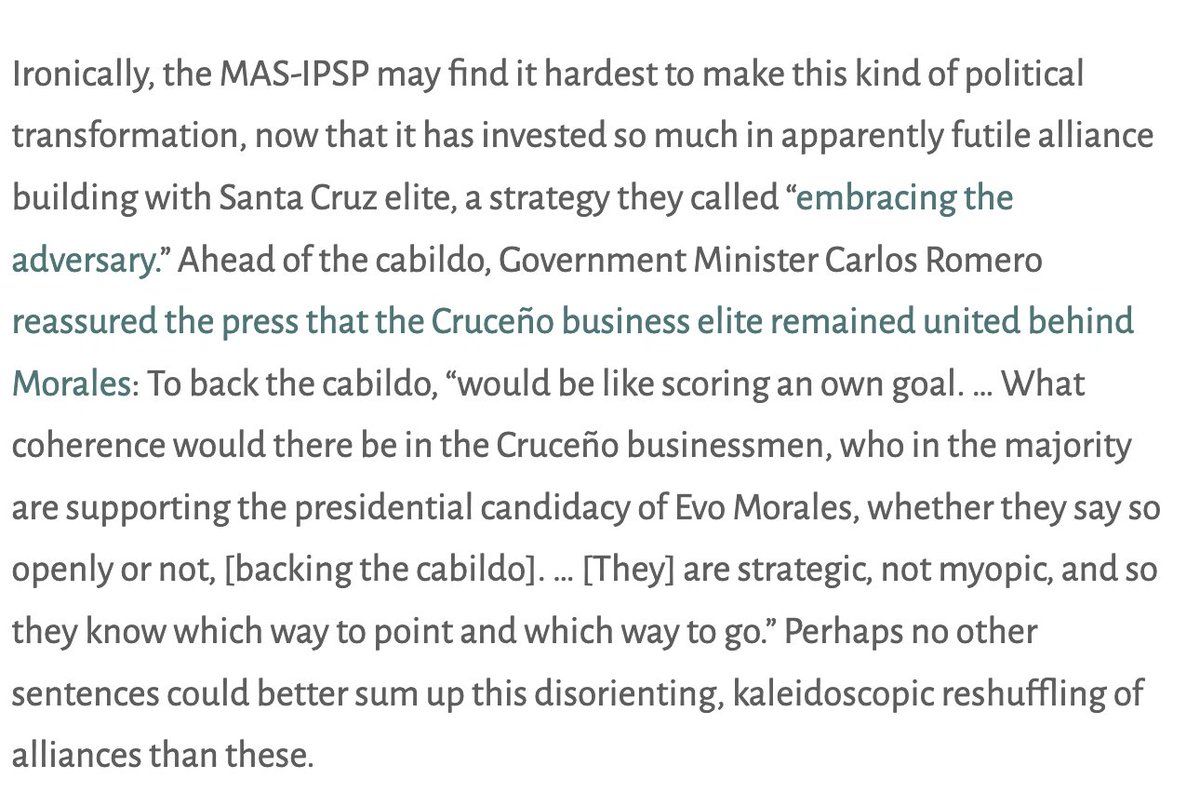-
Bolivian vice minister Freddy Bobaryn López writes devastating critique of centralization of power around Evo Morales, arguing it left the government vulnerable to attack. (cached, because it has been removed from state-run newspaper website) webcache.googleusercontent.com/search?q=cache:eWsGIwJDhQcJ:https://www.ahoraelpueblo.bo/el-sindrome-de-hubris-y-la-lucha-por-el-poder/+&cd=1&hl=en&ct=clnk&gl=us&client=firefox-b-1-d
-
The article, entitled "The hubris syndrome and the struggle for power," is a wide-ranging critique of Morales, his "entorno" of supporters, their hostility to dissent w/in the party, and inability to realize they were losing the public in October 2019.
-
"The entourage [around Morales] that offered theoretical justifications for the indispensibility of the great leader's presence as the sole guarantee of unity in the country, was wrong."
-
(A sentence which sits awkwardly in an article against fetishizing leaders.)
-
"Jefismo [i.e., the fanatical ideology around the chief] broke the glass ceiling* when it attributed to the social movement confederations the stubborn insistence on forcing a fourth candidacy to the presidency." * i.e., jumped the shark
-
(Morales, clearly in charge of the whole effort, insisted he was only running because of the urging of the grassroots movement confederations.)
-
"Because it was a situation that contributed to creating a no less passionate rejection from a society stupified before a narrative that justified the violation of human rights."
-
Bobaryn cites leftist theorist Rene Zavaleta Mercado, as well as anti-Stalinist leftism, to denounce "oligarchalization" and "bureaucratization" of grassroots movements:
-
"This made evident the bureaucratization within the social movements, materialized in the configuration of a privileged elite of leaders, who integrated themselves in a patron-client manner under a hegemonic command…
-
"thereby holding hostage the genuine and legitimate interests of the sectors they say they represent."
-
One might (though Bobaryn did not) point to the way that the current review of cabinet ministers by the Pact of Unity focuses almost entirely on cabinet's past partisan loyalty or handling of 2019, and not at all on policies that serve their base.
-
This article is the first time I've seen a public internal critique walking through the missteps of the MAS-IPSP during the 2019 crisis. Beyond the 4th candidacy, Bobaryn highlights the failure to negotiate a transition, and the continued faith in "allies" in the Cruceño elite.
-
"This happend while the entorno was preoccupied in extending a hand to the landlord lodges [i.e., high society clubs] of the East, even when the latter did not hesitate to finance the coup by way of Luis Fernando Camacho."
-
This mistake was already clear in October 2019, but some like Minister Carlos Romero doubled down on their ephemeral alliance with the Cruceño elite. woborders.blog/2019/10/07/cabildo-fires/
-
For Bobaryn, the "process of change" began to get its legs back with the uprising in defense of the wiphala, that began after Evo's fall. His analysis echoes the takes in this edited compilation around the so-called Revolution of the Wiphala. library.fes.de/pdf-files/bueros/bolivien/16622-20201119.pdf
-
That moment, he writes, "laid bare the inconsistencies and limitations of the parties, politicians, and [organizational] leaders who were overtaken by a reality that demanded 'renewal, change, reciprocity, harmony, and respect.'"
-
Bobaryn: "Where everyone thinks the same, no one is thinking. The disobedient ones who tried to make bad decisions visible or to reflect upon them, were purged and accused of being free-thinkers."
-
Many elements of this critique of how "the logic of power captured the process" systemicalternatives.org/2017/03/26/some-thoughts-self-criticisms-and-proposals-concerning-the-process-of-change-in-bolivia/
-
but Bobaryn (speaking as the defender, if not the mouthpiece of Choquehuanca) sees the solution as collective rather than individual, in a struggle for renewing the party/process of change.


